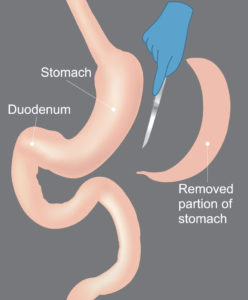 Gastric sleeve procedure is an alternative to the popular gastric bypass surgery which involves the reduction of your stomach, leaving your gastrointestinal tract intact.
Gastric sleeve procedure is an alternative to the popular gastric bypass surgery which involves the reduction of your stomach, leaving your gastrointestinal tract intact.
It allows you to avoid the common issues involved with the bypass, such as mineral and vitamin deficiencies and ulcers.
Just like any other bariatric procedure, it works through the reduction of your food intake. The weight loss from this allows you become healthier and leads to a better quality of life.
Find out if this procedure is right for you by contacting HTG today.
The operation involves the removal of a large part of your stomach, reducing its size by up to 80%. This means you will end up feeling full much faster and feel compelled to eat far less food. Your intestines will remain as they are, meaning all the processes that turn food into required nutrients will still function normally.
The term ‘sleeve’ comes from the new shape your stomach will take, which will be far more narrow and almost like a tube. The process is not reversible, however some stretching of the stomach may occur naturally later in life.
Gastric sleeve operation is suitable only to people with BMI over 30, alongside comorbid conditions, or people with BMI over 40. Whether or not the option is the best for you can be determined together with your surgeon.
When comparing the gastric bypass and sleeve operations, the former is more recommended to people with BMI above 45 as it can lead to a more rapid weight loss, which is best suited to a very high body mass. Moreover, the dumping syndrome is a more common occurrence with the bypass, which can make your eating more selective and therefore help you lose weight as well.
On average, the weight loss from getting a gastric sleeve is somewhat lower, but this might be preferable if your BMI is at an unhealthy level, but not high enough to warrant a bypass. If you wish to avoid mineral deficiencies, ulcers and more commonly occurring dumping syndrome, then the gastric sleeve surgery can be an option for you.
- Operation time: 1 to 3 hours
- Hospital stay: 4 days
- Recovery time: 4 to 6 weeks
- Work leave required: 2 weeks
As with other bariatric operations, the gastric sleeve will require you to be in hospital care for a few days to ensure the procedure was a success and to minimise any complications. What follows is a gradual increase in liquids, followed by liquid foods and eventually purees and other softer dishes, leading finally to being able to eat normal foods again by your fourth week of recovery, albeit in significantly lower amounts.
You will be set upon your new lifestyle with guidance from your surgeon or bariatric nurse who will also keep a check on any issues you might have. Just as with the gastric bypass, you will need to avoid certain foods, but not as extensively. Drinking and eating at the same time is discouraged as is lying down after eating, as it might cause acid reflux.
The operation will be most effective if you change your eating habits even after recovery. All bariatric surgeries give you the boost to do just that with pushing you to lower your food intake overall by a significant amount.
You can expect to lose around 60% of your excess weight if you adhere to a proper diet, which has been made a lot easier thanks to the operation.
It is easy to say that eating better and losing weight perfectly doable without surgery, but what most people don’t realise, is that the compulsion to eat is an old instinct that a lot of people just can’t overcome.
In addition, obesity carries a stigma that can lead to mental health issues that do not make this struggle any easier. Finally, physical limits and comorbid illnesses caused by a large body mass ensure that this is a struggle that is very difficult to overcome by anyone. These are reasons valid enough for doctors both in Europe and America to recommend bariatric surgery as a viable option.
Gastric sleeve operation can help you achieve a healthier weight, it is one of several bariatric procedures that might be available to you.
 Gastric sleeve procedure is an alternative to the popular gastric bypass surgery which involves the reduction of your stomach, leaving your gastrointestinal tract intact.
Gastric sleeve procedure is an alternative to the popular gastric bypass surgery which involves the reduction of your stomach, leaving your gastrointestinal tract intact.




